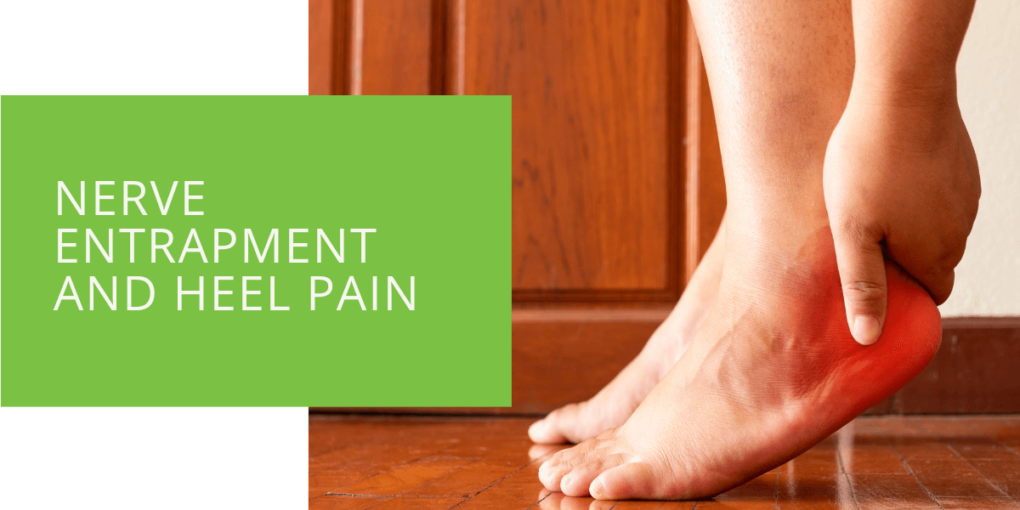Nerve Entrapment and Heel Pain
Nerve entrapment and heel pain are two conditions that can be related, with nerve entrapment potentially causing heel pain or other symptoms in the foot or ankle. If you are experiencing heel pain, it is important to understand the potential connection between these two conditions and how proper diagnosis and treatment can help alleviate discomfort and improve the overall quality of life.
This article will explore the definitions and causes of nerve entrapment and heel pain and how they can be related. We will also discuss the process for diagnosing and treating these conditions, including both non-invasive and surgical options. By understanding the connection between nerve entrapment and heel pain, you can take steps to manage your condition and live a more comfortable, active life.
What Is Nerve Entrapment?
Nerve entrapment, also known as nerve compression or nerve pinching, occurs when a nerve is squeezed or constricted, resulting in pain, numbness, tingling, or weakness. There are various causes of nerve entrapment, including injuries, inflammation, or swelling, and it can occur in any part of the body.
What Is Heel Pain?
Heel pain is a common condition caused by various factors, including overuse, injury, or underlying health conditions. It can be sharp or dull, accompanied by swelling, stiffness, or difficulty walking. Heel pain can be caused by problems with the bones, muscles, tendons, or ligaments in the foot or ankle and by issues with how a person walks or stands.

How Can Nerve Entrapment Cause Heel Pain?
Nerve entrapment can cause heel pain by causing irritation or inflammation of the nerve or disrupting the nerve's normal functioning. This can result in pain, numbness, tingling, or weakness in the heel or foot. Some specific nerves that can be entrapped and cause heel pain include the tibial nerve, which runs down the back of the leg and into the foot, and the lateral plantar nerve, which runs along the bottom.
Diagnosing and Treating Nerve Entrapment and Heel Pain
If you are experiencing heel pain, you must see a podiatrist or other medical professional for a proper diagnosis. A podiatrist is a doctor who specializes in diagnosing and treating foot and ankle conditions, including nerve entrapment and heel pain.
To diagnose nerve entrapment and heel pain, your podiatrist may conduct a physical examination, ask about your medical history and symptoms, and order imaging tests such as X-rays or MRIs. They may also perform nerve conduction studies or electromyography (EMG) to evaluate the function of your nerves.
Treatment for nerve entrapment and heel pain will depend on your condition's specific cause and severity. Non-invasive treatment options may include rest, ice, physical therapy, and medications to reduce inflammation or pain. In some cases, surgery may be necessary to relieve pressure on the entrapped nerve or to repair any damage.

Conclusion
Nerve entrapment and heel pain are two conditions that can be related, with nerve entrapment potentially causing heel pain or other symptoms in the foot or ankle. Proper diagnosis and treatment by a podiatrist or other medical professional can help alleviate discomfort and improve the overall quality of life. It is important to seek medical attention if you are experiencing heel pain or other foot or ankle symptoms that do not resolve independently.
FAQ
What is nerve entrapment?
Nerve entrapment is a condition in which a nerve is squeezed or constricted, resulting in pain, numbness, tingling, or weakness. It can be caused by injuries, inflammation, or swelling in any body part.
What is heel pain?
Heel pain is a common condition caused by various factors, including overuse, injury, or underlying health conditions. It can be sharp or dull, accompanied by swelling, stiffness, or difficulty walking.
How can nerve entrapment cause heel pain?
Nerve entrapment can cause heel pain by causing irritation or inflammation of the nerve or disrupting the nerve's normal functioning. This can result in pain, numbness, tingling, or weakness in the heel or foot. Some specific nerves that can be entrapped and cause heel pain include the tibial and lateral plantar nerve.
What are some common causes of heel pain?
Some common causes of heel pain include plantar fasciitis (inflammation of the plantar fascia), calcaneal nerve entrapment, and other injuries or conditions that affect the bones, muscles, tendons, or ligaments in the foot or ankle.
How is nerve entrapment and heel pain diagnosed?
To diagnose nerve entrapment and heel pain, a podiatrist or other medical professional may conduct a physical examination, ask about your medical history and symptoms, and order imaging tests such as X-rays or MRIs. They may also perform nerve conduction studies or electromyography (EMG) to evaluate the function of your nerves. In some cases, an injection or ultrasound may be used to evaluate the cause of your heel pain further.
What are some treatment options for nerve entrapment and heel pain?
Treatment options for nerve entrapment and heel pain may include rest, ice, physical therapy, and medications to reduce inflammation or pain. In some cases, surgery may be necessary to relieve pressure on the entrapped nerve or to repair any damage. Your treatment plan will depend on your condition's specific cause and severity.
I have chronic heel pain that feels like a burning sensation. Could this be caused by nerve entrapment?
It is possible that chronic heel pain with a burning sensation could be caused by nerve entrapment. Other potential causes of chronic heel pain include plantar fasciitis and other conditions affecting the foot, ankle's bones, muscles, tendons, or ligaments. It is important to see a podiatrist or other medical professional for a proper diagnosis to determine the cause of your heel pain and the most appropriate treatment options.

